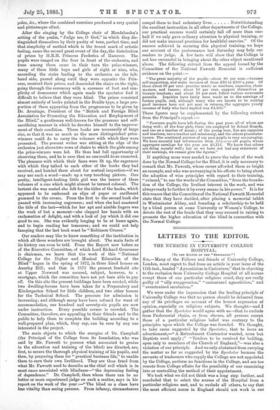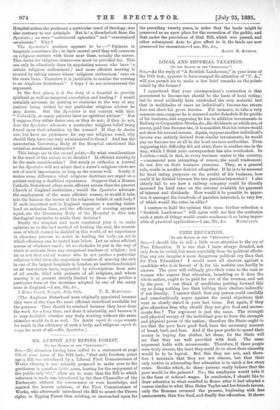LETTERS TO THE EDITOR.
THE NURSING IN UNIVERSITY COLLEGE HOSPITAL.
rro THE EDITOR OF THE " SPECTATOR...1 SIR,—Many of the Fellows and friends of University College, London, must regret to find from an article in your issue of the 11th inst., headed "Agnosticism in Caricature," that in objecting to the exclusion from University College Hospital of all nurses except those of one particular religious creed, they are really guilty of "silly exaggeration," "caricatured agnosticism," and "overstrained secularism."
We were under the impression that the leading principle of University College was that no person should be debarred from any of its privileges on account of the honest expression of opinion, especially on religions subjects. We thought—and I gather that the Spectator would agree with us—that to exclude from Professorial chairs, or from classes, all persons except those of a particular religious belief was contrary to the principles upon which the College was founded. We thought, to take cases suggested by the Spectator, that to issue an advertisment,—" A Refreshment Contractor wanted, none but Baptists need apply ;" "Tenders to be received for bedding, open only to members of the Church of England,"—was also a violation of our principle. And we only abstained from carrying the matter as far as suggested by the Spectator because the servants of tradesmen who supply the College are not appointed by the College, perform no functions in the College, and are too remote from College affairs for the possibility of our examining into or controlling the method of their appointment.
We took what we did not think was a long step further, and concluded that to select the nurses of the Hospital from a particular religious sect, and to exclude all others, to say that the most efficient nurse in England should not work in our Hospital unless she professed a particular creed of theology, was also contrary to our principle. But lo ! a thunderbolt from the Spectator; we were "caricatured agnostics" and "overstrained secularists." Why ?
The Spectator's position appears to be :—" Patients in hospitals sometimes die ; in their mortal peril they will converse on religious matters with those near them, usually the nurses. This desire for religious intercourse must be provided for. This can only be effectively done by appointing nurses who have a certain religious enthusiasm ;' and more efficient nursing is secured by taking nurses whose religious enthusiasm ' runs on the same lines. Therefore it is justifiable to confine the nursing to an Anglican Sisterhood." I hope I do not misrepresent the argument.
In the first place, is it the duty of a hospital to provide spiritual as well as temporal consolation and healing ? I would certainly advocate its putting no obstacles in the way of any patient being visited by any particular religions adviser he may desire. But the Spectator is not content with this. "Unluckily, so many patients have no spiritual adviser." But I suppose they either desire one, or they do not; if they do not, does the Spectator advocate a particular religions belief being forced upon their attention by the nurses ? If they do desire one, but have no preference for any one religions creed, why should they have one only administered to them.? Alta has the nnsectarian Governing Body of the Hospital sanctioned this sectarian missionary enterprise?
This brings me to the second point,—By what considerations is the creed of the nurses to be decided ? Is efficient nursing to be the main consideration ? But surely so orthodox a journal as the Spectator will not admit that a nurse's religious views are not of much importance, so long as she nurses well. Surely it makes some difference what religious doctrines are urged on a patient making a deathbed repentance. Suppose that a Roman Catholic Sisterhood offers more efficient nurses than the present Church of England institution; would the Spectator advocate the employment of the more efficient nurses, or would it take into the balance the merits of the religious beliefs of each body P If each important sect in England organises a nursing sister- hood on sectarian lines, and the efficiency of nursing appears equal, are the Governing Body of the Hospital to dive into theological mysteries to guide their decision?
Surely the simplest and most consistent plan is to make opinions as to the best method of healing the soul, the correct- ness of which cannot be decided in this world, of no importance in choosing persons to assist in healing the body, an art in which efficiency can be tested here below. Let us select efficient nurses of whatever creed ; let no obstacles be put in the way of visits to patients from any recognised teachers of religion ; but let us not shut out all women who do not profess a particular religions belief from the important vocation of nursing the sick in one of the largest hospitals in London, an institution founded on an unsectarian basis, supported by subscriptions from men of all creeds, filled with patients of all religions, and whose nursing is at present strictly limited to those who profess a particular form of the doctrines adopted by one of the many sects in England.—I am, Sir, &c,
1 Essex Court, Temple, July 18th. T. E. SCRIITTON.
[The Anglican Sisterhood were originally appointed because they were at the time the most efficient sisterhood available for the purpose. They should be retained because they have done the work for a long time, and done it admirably, and because it is very doubtful whether any body working without the same stimulus would do it as well. No doubt esprit de corps counts for much in the efficiency of such a body, and religions esprit de corps for most of all.—En. Spectator.]



































 Previous page
Previous page